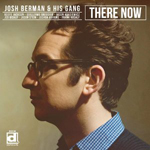|
|
 |
Dusted Reviews
Artist: Josh Berman & His Gang Album: There Now Label: Delmark Review date: Aug. 29, 2012 |

|
|
|
 |
Jazz musicians in Chicago know their regional roots. An assimilation of local history is nearly a requisite for recognition in the teeming Windy City scene. Delmark is similarly calibrated to Chicago’s time-honored place as a nexus of jazz strains, with a library of releases that reaches back to the beginnings of the music in Dixieland and swing. That easy confluence makes it an ideal outlet for cornetist Josh Berman’s latest project documented on There Now. Convening seven comparably versed colleagues, his “gang” applies the AACM mantra — “Ancient to the Future” — to a novel context by referencing the swing-centric saloon bands Eddie Condon, Pee Wee Russell and Bud Freeman led in the city nearly a century ago and integrating a shared free improvisation sensibility steeped in the present.
Berman’s sidemen are all familiar faces in the Chicago free jazz firmament of the now, but the pieces he chose for the date are very likely less so to younger followers of their work. Shaggy tunes like “Sugar” and “Liza” are so antiquated that the signifier “standard” isn’t even adequate in quantifying their advanced ages. Under Berman’s deft arranging scalpel, they receive surprisingly rich and complex facelifts that retain their basic melodic bone structures while opening up fertile composite space for the sort freewheeling, fast-paced interplay that the band members thrive on.
The blend between antiquated and original forms works well most of the time, but there are moments where Berman’s inclusive designs for the material don’t always coalesce into a satisfying whole. Such is the case on the fractious finale blowout “Mobile and Blues,” where a prolonged and clamorous free section almost finds the players slipping into churlish self-parody. Most of the time though, the level of density and disparity between individual and group contributions produces thrills and surprises, as the players balance pithy organic solos with layered interaction that bolsters the sum. The old Charlie Christian staple “I’ve Found a New Baby” is a vibrant example as it exchanges expected ensemble élan for sobriety, and plants bassist Josh Abrams front and center with the rest of the band acting a bit like a loquacious Greek Chorus.
Vibraphonist Jason Adasiewicz provides the prominent melodic voice on “One Train May Hide Another” in a coruscating display of mallet play. Tenorist Keefe Jackson and trombonist Jeb Bishop are the initial fulcrums for the brisk and rowdy “Cloudy,” while Jason Stein’s bass clarinet makes a by turns lovely and rambunctious go at the aforementioned “Sugar.” An elliptical Jackson solo that precedes him, while playfully alien to a strict Condonian reading of the piece, still retains visceral sense within the created context.
Clarinetist Guillermo Gregorio stands a bit apart as the elder of the group, and Berman employs him as the connecting thread on the disc’s opener, a raw and ribald reading of the Bing Crosby vehicle “Love is Just Around the Corner,” and with loquacious bookending statements on “Liza.” It’s no act of lip service charity — Gregorio’s been at this sort of creative revisionism thing for decades, mashing together the older and newer scraps of jazz history into alloys that often end up yielding results as fascinating or even surpassing the original sources.
By Derek Taylor
|







